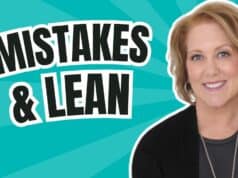The BBC highlights lean practices and provides a stunning contrast between Toyota and Ford in this article:
BBC NEWS | Business | The triumph of lean production
On the assembly line at Toyota's giant plant, Laura Wilshire is not happy.
There is something wrong with a seatbelt fitting on the Camry she is working on.
Laura pulls a cord, stopping the production line – and prompting her five fellow workers on trim line three to crowd round.
They soon see why it is not screwed in properly and fix the problem.
“I don't like to let something like that go,” she says. “That's really important for people who buy our cars.”
There's a huge cultural difference between Toyota and Ford. Even with Ford's attempts at reclaiming the “Ford Production System,” all of the lean design and lean documentation doesn't matter if you're not going to “manage lean, ” including letting workers pull the cord to fix quality problems.
Here's a stunning difference:
Workers at the Toyota plant in Georgetown, Kentucky, pull the cord 2,000 times a week – and their care is what makes Toyota one of the most reliable, and most desired, brands in the US.
In contrast, workers at Ford's brand-new truck plant in Dearborn, Michigan, pull the cord only twice a week – the legacy of generations of mistrust between shop-floor workers and managers.
Why do you think the Ford workers were only pulling the cord twice a week? Did they have fewer problems than Toyota's assembly line?
The article doesn't delve deeper into Ford, but instead looks at GM's efforts to catch up to Toyota from a labor productivity standpoint. But it mentions nothing about quality or how GM's “andon” (not “andan” as the BBC spelled it) process works any better than Ford's. GM has had the chance to learn from Toyota at NUMMI, so you'd hope they would have a more robust line stop and quality improvement process. Do they?
The article doesn't draw a direct comparison to GM, Ford, and Chrysler building what they want (or what they can) and dumping it on dealers, but I will. Here's Toyota's approach:
Toyota also has a close relationship between the dealers who sell its cars and its plants.
The production run is adjusted at the Georgetown plant, and extra Saturday working is added, only when computerised orders from the dealer network show it is needed.
And individual buyers can alter what they want in their car – changing the paint colour or specifications – right on the production line, by notifying their dealers.
Let's not point out management practices as the differences between the “Detroit 3” and Toyota… let's blame healthcare and currency policy. Right. The differences between Toyota and the Detroit gang are so obvious. Having a better management system — that's the key to Toyota's success.
The article ends with some added cynicism from our friend and future Podcast guest Jim Womack:
At a deeper level, the question is whether GM and Ford – the companies that perfected mass production -can fundamentally change their culture to the new lean production system.
“I hope they make it – but I am not optimistic they all will be able to,” says James Womack, an expert who has advised many global companies, from Tesco to Boeing, on the advantages of lean production.
Mr Womack says it has to be something that is inculcated in all the company's workers, from the bosses to those on the factory floor.
“This is not Japanese companies vs American companies, it is smart Japanese companies vs smart American companies,” he says.
“GM has caught up on assembly plants, but Toyota is still ahead on suppliers, product development and a problem-solving approach to issues.
“For too long, managers at US car companies were in denial about their problems.”
What do you think?
What do you think? Please scroll down (or click) to post a comment. Or please share the post with your thoughts on LinkedIn – and follow me or connect with me there.
Did you like this post? Make sure you don't miss a post or podcast — Subscribe to get notified about posts via email daily or weekly.
Check out my latest book, The Mistakes That Make Us: Cultivating a Culture of Learning and Innovation:










[…] equipment), but your culture is one where supervisors yell at people for stopping the line (as written about here), it’s a bad […]
[…] I’d be curious to know the details behind “was replaced later in the assembly process with the correct one.” I’d hope, in a way, that the problem was just not detected until later. If the defect HAD been discovered, the good practice from Lean and the Toyota Production System would be to stop the line so it didn’t have to be fixed later. Some Big Three (Detroit Three) plants have struggled with the culture change required to allow workers to “stop the line” when they see a problem (like this fairly recent story about a Ford truck plant). […]
[…] Read this classic tale from 2007 about the mindset differences at Toyota (you must stop the line) ve…duction). I’m guessing that, at Boeing, it’s OK to stop the line because they value root cause problem solving and the prevention of other problems. This is a Lean principle used at Virgina Mason Medical Center (also in Seattle). They use the principle in their “patient safety alerts” which emphasizes calling out problems (or risks) when you see them and getting the problem resolved for future prevention (this goes well beyond normal “fire fighting”). See related blog posts about this concept at VMMC. […]
[…] Read this classic tale from 2007 about the mindset differences at Toyota (you must stop the line) ve…duction). I’m guessing that, at Boeing, it’s OK to stop the line because they value root cause problem solving and the prevention of other problems. This is a Lean principle used at Virgina Mason Medical Center (also in Seattle). They use the principle in their “patient safety alerts” which emphasizes calling out problems (or risks) when you see them and getting the problem resolved for future prevention (this goes well beyond normal “fire fighting”). See related blog posts about this concept at VMMC. […]